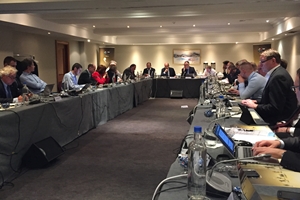
2016 FIBA Europe General Assembly concludes in Dublin
DUBLIN, Ireland - The leaders of Europe's national basketball federations gathered in Dublin, Ireland on Saturday for the annual FIBA Europe General Assembly.
The 45 national federations represented in the Irish capital were greeted by the President of the European Olympic Committee (EOC) and International Olympic Committee (IOC) member Patrick Hickey, himself an Irishman.
FIBA Europe President Turgay Demirel addressed the delegates who were then presented reports by the different commissions of FIBA Europe as well as by FIBA Executive Director - Europe, Kamil Novak and Walter Pfaller, the President of the European zone of the International Wheelchair Basketball Federation (IWBF).
FIBA Secretary General and IOC member Patrick Baumann was the last to address the Assembly, touching upon a number of subjects.
In his speech, Demirel thanked Hickey and Basketball Ireland for the warm hospitality and organisation. He then spoke about how basketball continues to grow in every country in Europe and praised the organisers of the most recent flagship events, Romania and Hungary (EuroBasket Women 2015) and France, Germany, Latvia and Croatia (EuroBasket 2015).
He explained that EuroBasket 2015 set a new standard for international basketball events and that the decision to host it in four different countries was critical to this remarkable success. In light of that, the FIBA Europe Board decided last December to host FIBA EuroBasket 2017 in four countries once again and selected Finland, Israel, Romania, and Turkey as hosts.
He said: “The strength of basketball across Europe and the resulting parity is what makes EuroBasket and EuroBasket Women the world’s best continental championships. Every single game offers excitement and unpredictability. That is what drives record ticket sales, television ratings, and marketing revenues.
“And with the implementation of the new FIBA Competitions Calendar we have more opportunities than ever before to promote our national teams. The FIBA EuroBasket Women 2017 Qualifiers last November and February proved the potential for in-season national team games. And starting in 2017 with the qualifications for the FIBA Basketball World Cup 2019 we as FIBA Europe will be ready to take full advantage in all participating countries.
“I am proud that FIBA Europe is doing more than ever before to help our federations participate in European youth championships every summer. Our financial support has helped 253 men’s teams and 212 women’s teams take to the court in the last two years. Last summer a record 51 FIBA Europe countries participated in these tournaments.
“We continue to support grass roots initiatives. We continue to provide 50 percent of project costs up to EUR 25,000 for federation efforts to support grass roots.
“Europe is also leading the international basketball community in 3x3. When we look at the international rankings, European teams are dominant.”
With regard to the re-modelling of the European club competitions, Demirel referred to the “difficult but correct decisions” that the Board had to make in recent months in order to protect the future of European basketball and its pyramidal structure, through potential sanctions. He mentioned that the Board were pleased to see that the responses of the federations have been impressive and that many have taken action to strengthen governance within their own countries and across Europe.
He continued: “National teams no doubt are the locomotive of international basketball. But clubs are also an essential partner in our efforts to grow the sport of basketball in Europe. European leagues offer the best basketball outside of the NBA. Our clubs invest in the development of elite players.
"That is why over the past year we have devoted tremendous time and energy to strengthening our relationships with clubs and our club competitions. This includes launching the FIBA Europe Cup, which featured 56 teams.
“The Basketball Champions League is an important piece of the puzzle. It offers a 50-50 partnership between FIBA and European basketball leagues. Participation is based on sporting success, because access to elite European basketball based on fair sporting criteria is the only path to elevating the status of basketball across Europe; not just in a few select countries and not just to the financial benefit of a handful of clubs.
“In recent weeks we have met with the leadership of Euroleague Commercial Assets (ECA). We are co-operating with the European Union to find solutions. We will continue to keep our member federations aware of the latest developments moving forward.”
Demirel concluded that FIBA Europe’s commitment to European federations will continue in every way possible.
The 2017 FIBA Europe General Assembly was assigned to the German capital, Berlin.
With regard to Mrs Julia Anikeeva’s incapability to attend the regular meetings of the Board of FIBA Europe, the Board, taking into account these exceptional circumstances (force majeure) and based on provisions of the FIBA Europe bye-laws, decided to appoint Mr Andrei Kirilenko, the President of Russian Basketball Federation as a member.
###
About FIBA
FIBA (fiba.com) - the world governing body for basketball - is an independent association formed by 215 National Basketball Federations throughout the world. It is recognised as the sole competent authority in basketball by the International Olympic Committee (IOC).
For further information about FIBA visit fiba.com or follow FIBA on facebook.com/fiba, twitter.com/fiba, instagram.com/fiba and youtube.com/fiba.















